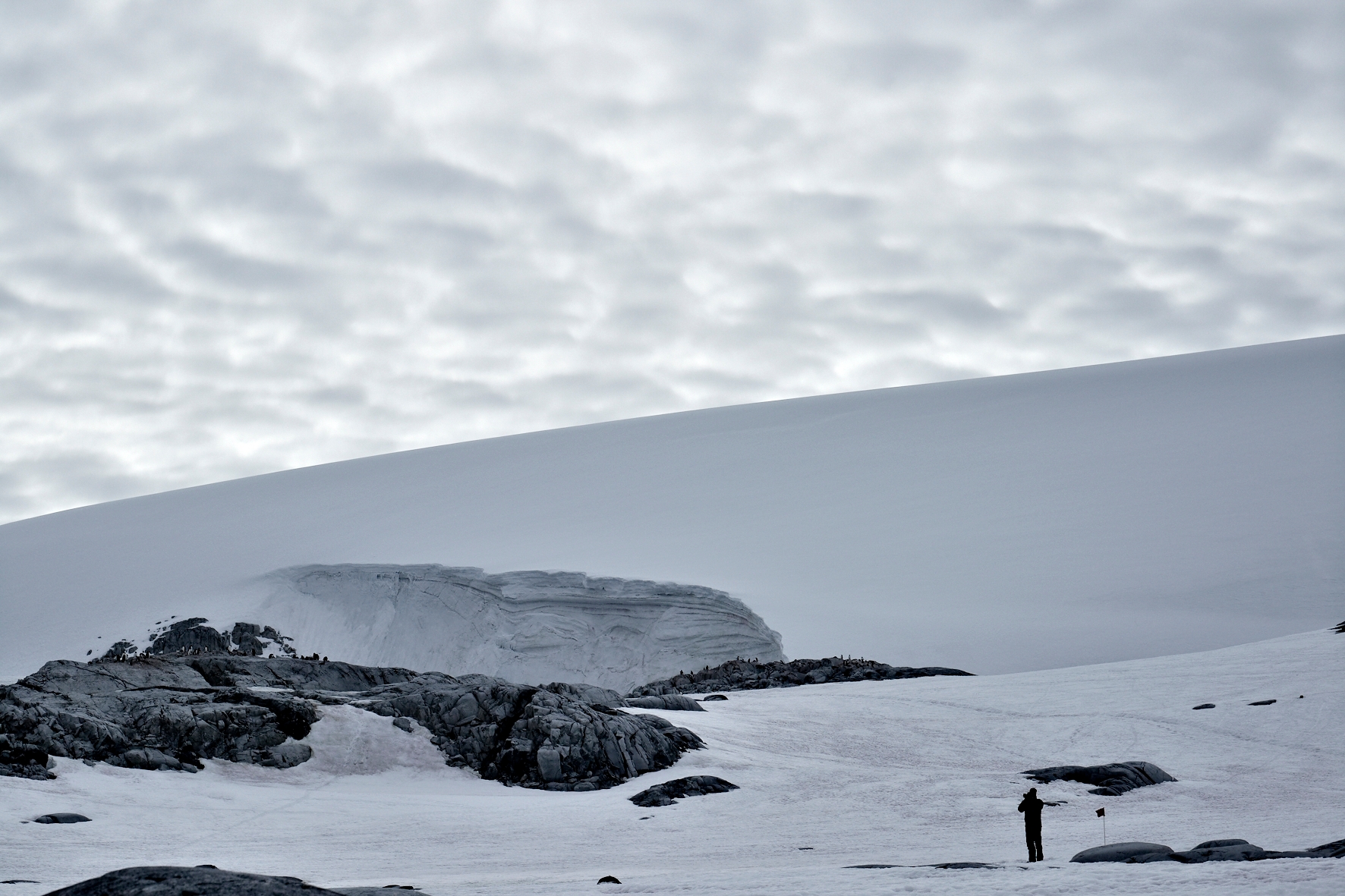WORDS AND PHOTOGRAPHY BYOlaf Willoughby
Listen to this story. Narrated by Olaf Willoughby.

WHITENESS. Solitude, shrine, sanctuary.
More WHITENESS. Spirit, soul.
Still more WHITENESS. Sublime, self.
More WHITENESS. Spirit, soul.
Still more WHITENESS. Sublime, self.
The mountainous landscape achieves the impossible. The sky blends into the land in a seamless saturation of grey-white snow and ice. I watch from the boat as my colleagues pick their way slowly along a slippery ridge, climbing to a lookout point: Nine tiny yellow-jacketed figures, dwarfed by the silence.
I feel an odd tension. The porthole frames this safe, slightly surreal picture and yet, outside, there is a very real sense of danger and survival. I change into multiple layers of clothing, step through tubs of disinfectant to prevent my boots from carrying germs to the shore and wait. I’m on the following zodiac, a small inflatable synthetic rubber boat, where passengers hold on to “grab lines”, ropes strung around the edges to avoid being bounced overboard by the waves. My senses stir. Shortly, I’ll be joining them.
Simultaneously joyless and joyful, the Antarctic is one of the most intriguing places on Earth. It’s the coldest, driest, windiest and most isolated continent. And somehow fittingly, the last to be discovered. Originally part of the supercontinent, Gondwana, it fragmented over 150 million years. Summer is continuous sunlight. Winter is continuous darkness when the surrounding ocean freezes to double Antarctica’s size.

The science is fascinating but it’s the poetry of the experience that calls out to the soul. Seeing the Antarctic from a plane or in a book is merely inspiring. Feeling the frozen shoreline beneath my feet, breathing in the icy air, engulfed in the whiteness of snow in every direction, the impact induces incredulity at the spectacle and simultaneously a state of shock. It is the closest I’ve ever been to a spiritual experience.
Ignored by penguins walking right by me, I realize this landscape is indifferent to my presence. That was confirmed by the safety briefing, which gave us just a few brief moments of life if we fell into the numbing sea waters. Yet I’m exhilarated. This is Mother Nature in all her ferocious grandeur. These conflicting views of two great Antarctic explorers beautifully express my thoughts.
“The land looks like a fairytale.”
– Roald Amundsen [Norwegian explorer and the first to reach the South Pole in the 1910-1912 expedition]
“Great God, this is an awful place”
– Robert Scott [British explorer who failed in his attempt to be the first to reach the South Pole. His party died on the Ross Ice Shelf in 1912]



Mountains exude a mystical pull, a force field that innately attracts seasoned climbers and curious wanderers from across the planet.
Those of us living far beyond the mountains feel this pull, too. Picture a family trip to bustling New York City. It will likely include the family taking the speedy elevator to the top of the Empire State Building, where the panoramic views take their breath away. Roam through Cambodia, curiously climbing the 800 steps leading to a hilltop shrine. Is there much of a difference in the underlying animating force behind this shared desire to witness the world from great heights?
Whether we climb, hike, run or walk, the appeal of ascent, getting to look out points is a deeply embedded attraction that binds many of us together. I believe it’s a quest for perspective. In some way, we want the mountain to reveal our inner landscape. It’s these mountains of the mind that I want to explore here.
When scaling heights, we temporarily leave our daily lives suspended below. As the noise fades, we pause and breathe in the fresh air of altitude. It’s an opportunity to reflect—possibly just on the streets, roofs, and trees before us. Or maybe our instinct to discover inner depths can be tapped by using heights?

Abraham Maslow, an eminent American psychologist, offered penetrating insights into the human psyche. His theory of a hierarchy of needs, symbolised by a five-step pyramid, proposed that fundamental physiological needs must first be fulfilled before ascending to the higher realms of safety, love, esteem, and self-actualization. Today, he remains a key figure in understanding human motivation.
It occurs to me that our quest to reach lofty viewpoints is, in effect, climbing Maslow’s Pyramid. Consciously or subconsciously, the mountains of the mind could be the map of our journey to self-discovery.
A one-off family vacation may not offer many opportunities for self-development, but an epic mountain hike or climb can provide two journeys: the adventure of ascent and the journey of self-discovery.
The first journey is physical, while the second is metaphysical. It may remain unattempted, yet always awaits patiently in the shadows.

“Nobody climbs mountains for scientific reasons. Science is used to raise money for the expeditions, but you really climb for the hell of it.”
~ Yvon Chouinard
[Founder of the outdoor clothing and gear company, Patagonia, American rock climber, environmentalist and philanthropist]
This is about the splendour of the mountains, the geology, the spectacle. Tangibly dangerous towering heights, ravines, rivers, and rift valleys, the physical trials of rugged terrain, and unpredictable weather. Even as we plan, we know the mental toughness required means we will confront our limitations. Once we start, we experience a sense of risk and reward that frees us from our daily concerns and energises us to push onwards.
Reaching the summit can be exhausting; the vista can be so inspiring that it’s overwhelming. We pause for a while before our social conditioning leads us to a few group celebratory whoops and the essential selfies before heading back home, hopefully with the immense satisfaction of a job well done.
For most people, this is understandably sufficient. For some, the effort of clambering up Maslow’s Pyramid is just one moment in a spiritual quest lasting many lifetimes.

“It is not the mountain we conquer, but ourselves.”
~ Edmund Hillary
[New Zealand mountaineer, explorer, and philanthropist]
On the 29th of May 1953, Hillary and Sherpa mountaineer Tenzing Norgay became the first climbers confirmed to reach the summit of Mount Everest.
Mountains offer a portal to a world far from our suspended daily responsibilities. Taking these trips several times is the equivalent of regular meditation. Each offers the chance to go deeper into the journey, and each trip becomes a stepping stone to self-discovery.
We activate our right brains, enabling us to think about the bigger picture and handle contradiction and ambiguity. This experience can be a personal pilgrimage with sacred, spiritual or religious connotations. Equally, it can be a chance to shut down the noise and clamour of civilization and listen to our intuition.
It’s simple to explain, but it can also be a difficult path. Insights are complex; transcendence suggests solitude, which is not necessarily available in groups and not everyone is interested or ready. And whilst it’s a grand romantic vision, it seems increasingly out of step with our evidence-based, chaotic and fractured lives. In contrast, the timelessness of the mountains calls to mind our human history and the deep role played by mythology.
Carl Jung believed that when ancient gods like Zeus and Athena were no longer widely worshipped, they did not disappear entirely. Instead, they became a part of each individual’s psyche or mind. So, as religion and mythology declined, the focus shifted from worshipping these gods collectively to each person’s inner experience of them. So, the rise of science, with all its insistence on measurement and analysis, unravelled a mythology that had served humanity for thousands of years as a collective pressure valve.
Making a similar point, Prof. Iain McGilchrist, a neuroscientist, believes that the left brain usurped the right brain when science led to the dominance of logic and our relentless need to categorize, cluster, order and file everything. In that process, mythology crumbled, denying us access to that part of our being that longs for a symbolic connection to something greater, a sense of the bigger picture, or perhaps the cosmic Web of Indra – a delicate lattice connecting all things…
The mountains are the keepers of this bigger cosmic picture. They are portals leading us from the mundane into the profound.

The Antarctic can be a source of several tensions, from the ethereal whiteness to the ever-present danger, from the mysterious allure of the mountains to the indifference of the landscape, from the physical challenges to the metaphorical climb up Maslow’s Pyramid to self-actualization.
The common denominator is an underlying duality. On the one hand, we are motivated to conquer a mountain and overcome its immense challenges. It can be an impressive athletic and mental feat that provides reward and recognition.
On the other hand, mountains inspire people with their profound beauty. The summit can be a place of solitude, even sanctuary. Mountains represent nature in a pristine, almost untouched form. Many climbers have written of feeling spiritually connected to the mountains or feeling a sense of insignificance next to their grandeur.
The weighting of this interplay between the human spirit and the natural world varies widely within each of us. Do we see the beauty or the bleakness? Timeless mountains, physical triumphs, and spiritual experiences mix with what some may see as a cold hostile environment.
It is comforting to think that we can both scale external heights and plumb internal depths, but ultimately, the meaning of each of us vesting in mountains remains an enigma. And perhaps this is the way it is meant to be? The summit of selfies achieves popularity while the summit of self-discovery remains hidden, awaiting those with the determination to look inward.


“You never conquer mountains.
You stand on the summit a few moments; then the wind blows your footprints away.”
~ Arlene Blum.
[Arlene Blum is an American mountaineer, writer, and environmental health scientist who is best known for leading the first successful female American ascent of Annapurna]
